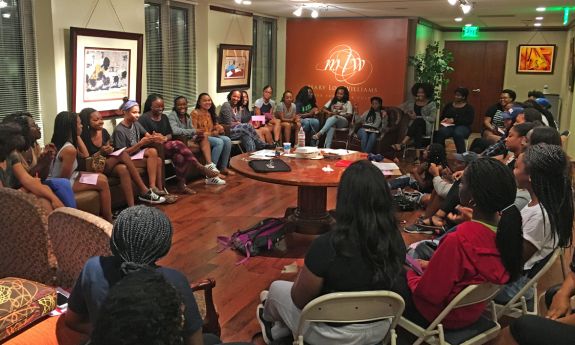A Legacy of 40 Years: Mary Lou Williams Center for Black Culture at Duke
Named after jazz artist Mary Lou Williams, the center that opened in 1983 celebrates Black culture and history

Celebrate Mary Lou Williams
On April 14, 2024, the Duke Chapel Choir and guest artists will perform some of Mary Lou Williams' music as part of a special event "Our First Lady of Jazz: Celebrating Mary Lou Williams."
“There is something about these traditions that really makes Duke livable for a lot of students,” said Corey Pilson, a 2020 Duke graduate who works as a Balthrop-Cassidy Fellow in Duke Student Affairs. “You see that you’re not here by yourself.”
The Mary Lou Williams Center for Black Culture opened in 1983 and is named after Mary Lou Williams, a jazz pianist and composer, who worked with Duke Ellington, Miles Davis and Dizzy Gillespie. Williams joined the Duke faculty in 1977 as an artist-in-residence, teaching students and delighting audiences until her death in Durham in the May of 1981.
To mark the center’s 40 years at Duke, a free community cookout is September 29 and a celebratory gala on September 30 in downtown Durham will give students, and all staff, faculty, alumni, and community members a chance to celebrate the center’s history of building bonds and giving Black students a space of their own.

The center opened 20 years after Duke’s first Black undergraduates enrolled – to “preserve and enhance Black culture at Duke University.”
Black students had advocated for a space of their own for more than a decade, and in a planning meeting in the fall of 1981, student Hamida-Jackson Little suggested naming the center after Mary Lou Williams.
Jackson-Little, who graduated from Duke in 1983 and is now a lawyer in Atlanta, recalls taking a class taught by Williams.
She said Williams did more than play songs and tell stories of collaborating with jazz icons. She explained the technical aspects of compositions and context of how jazz related to what was happening in society.
“She was so instrumental in helping us understanding the music and the history of it,” Jackson-Little said. “It wasn’t just a class where you listened to music. She taught us the structure and wanted us to understand what the music meant for African Americans and their struggle. She was a treasure.
On September 24, 1983, the Mary Lou Williams for Black Culture officially opened in the lower level of what is now the Brodhead Center with a ceremony featuring Nobel Prize-winning author Toni Morrison.

Under the guidance of Founding Director Edward Hill, the space became a refuge for students of all backgrounds who could find discussions of pressing social and cultural issues of the times, featuring leading minds from Duke and beyond.
“It was a small space, but an active space,” said Duke graduate Maureen Cullins, who served as interim director of the Mary Lou Williams Center in the early 1990s and now directs the Duke University School of Medicine’s Multicultural Resource Center. “We had musicologists, journalists, artists and scholars come to the space for programming. It was a very rich environment.”
In 2013, the center moved to a comfortable two-story space in the Flowers Building, which is currently undergoing renovations. It’s been there that new staples, such as the Wednesday night Jazz@MaryLou performances, continue to attract the whole Duke community into the center’s welcoming walls.
“For me, the center has served as a place of reflection and where you can always find support from community members, whether it’s students, faculty or staff,” said Office of Durham and Community Affairs Program Coordinator Desmond Gatling, a Duke graduate who often visits the center. “It’s one of the cornerstones of campus.”
Send story ideas, shout-outs and photographs through our story idea form or write working@duke.edu.
Follow Working@Duke on X (Twitter), Facebook, and Instagram.